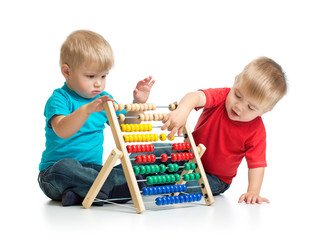
The Greek word “abax,” which meaning “flat surface” or “board,” is the source of the English term “abacus.” Abacuses come in a variety of cultural forms, each having an own layout and application techniques. All things considered, the abacus has been an important part of mathematics history and is still a useful teaching tool today.
To represent numbers and carry out fundamental mathematical operations like addition, subtraction, multiplication, and division, people use an abacus, which involves sliding beads. The abacus is an antiquated instrument that is still occasionally used in education to aid pupils in comprehending and visualizing mathematical ideas.
Meaning:
An abacus is a mathematical instrument used for counting. It features wires or rods that are beaded. You may do simple math operations like addition and subtraction by moving the beads to represent integers. It resembles a basic, antiquated calculator that was in use before more advanced models were created.
For ages, people have performed mathematical calculations using the abacus, an ancient counting tool. A rectangular frame with wires or rods holding beads that may be moved back and forth is what it is made of. The beads on the rods have varying values, and each rod indicates a place value (such as units, tens, or hundreds)
Why is Abacus learning important for children?

For many children, starting the fascinating path of learning arithmetic is like going on an adventure. Imagine being able to make numbers your friends by using a special tool, the abacus, which is like having a superhero sidekick!
Addition, subtraction, multiplication, and division become thrilling tasks when the abacus steps in to help. It’s similar like possessing a secret code to solve math mysteries!
Learning math with an abacus turns arithmetic into a fun puzzle to solve. You get more self-assured and enthusiastic the more you work with numbers. It’s like learning about the incredible powers of arithmetic at an early age!
Prepare yourself for the coolest adventure ever—a math-tactic trip in which the abacus turns numbers into your allies!
Abacus’s importance:
Sure! Students can gain a lot from abacus learning, which transforms arithmetic from a dry subject into an interesting and self-boosting activity. In this way, it is beneficial.
- Improves Calculation Skills: Gives kids the ability to calculate more quickly and precisely, which improves their general math competency.
- Encourages Stress-Free Learning: This approach makes math lessons fun and easy to understand while building students’ self-confidence.
- Strengthens Problem-Solving Abilities: Fosters the growth of critical thinking abilities and a facile approach to mathematical issues.
- Increases Concentration Levels: Focuses and concentrates kids, assisting them in being conscious and attentive during math assignments.
- Increases Self-Confidence: As kids gain arithmetic proficiency, a sense of accomplishment is given, which raises self-esteem and confidence.
- Develops Mental Skills: Students benefit from improved memory and visualization abilities, which enable them to mentally manipulate and comprehend mathematical topics.
- Boosts Writing and Reading: Encourages creativity and memory, which helps in writing and reading.
Students engage in a comprehensive learning method by using the abacus to activate brain sensors through practical tasks. Abacus learning can be an enjoyable and useful technique to help your kids develop a solid foundation in math’s if you’re trying to assist them on their math journey.
“Are you ready to help your children with Abacus?”
